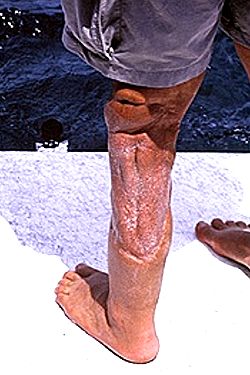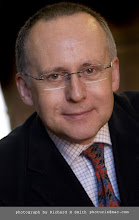Fit the third: Climbing mount impossible or - why opening your mind to incredible notions is not always a good idea
“But Scientists, who ought to know,Believing that what everyone thinks impossible might just be possible is generally held to be something of a virtue in scientists. After all, the Earth is round. Space is curved. Continents do move. And we know these things because someone once had the courage to believe the impossible. But it isn’t always like that. Sometimes the impossible really is impossible.
Assure us that they must be so....
Oh! let us never, never doubt
What nobody is sure about!"
Hilaire Belloc, The Microbe
Ichthyologists, the happy band who study fish, are almost unanimous in the view that yogic breathing techniques provide absolutely no protection against shark attack. Behavioural ecologist Erich Ritter, a Swiss researcher based in Miami, held a different view, however. He had long espoused the method that all his colleagues pooh-poohed as impossible. And in April 2002 the world’s media reported that he was now recovering in St Mary's Medical Centre, West Palm Beach, Florida, after an adult bullshark - unimpressed by the yogic inhaling - took a chunk out of Dr Ritter’s leg (on camera).
 Dedication to proving sincerely held theories - to the point of folly and beyond - is one of those things for which the public admires scientists. Stories of scientists risking their lives in the pursuit of truth do them no harm in public relations terms, even when they are spectacularly wrong – which, writing about his story at the time, I offered as some slight consolation to Dr Ritter during his convalescence. Happily, Dr Ritter has made a good recovery and is now back in the water.
Dedication to proving sincerely held theories - to the point of folly and beyond - is one of those things for which the public admires scientists. Stories of scientists risking their lives in the pursuit of truth do them no harm in public relations terms, even when they are spectacularly wrong – which, writing about his story at the time, I offered as some slight consolation to Dr Ritter during his convalescence. Happily, Dr Ritter has made a good recovery and is now back in the water.However, concern about the image scientists have with the public – so much the vogue in the 1980s (Fit the first) – has now taken on a more serious cast. Scientists today seem to have given up worrying about how to combat unhelpful media clichés and the like. In the wake of foot and mouth, mad cow disease, nuclear waste disposal and all the rest, the big issue of the moment has become - public trust.
So serious is this situation thought to be that The Royal Society dedicated its very first National Science Forum to examining the subject (Do we trust today’s scientists? Royal Society, March 6 2002). Several of my media and media relations colleagues spoke at it. There was a debate with non-scientists. There was a panel of the great and good, who agreed to answer questions from the floor. There were regional versions too, linked by video. All in all, it was quite an effort, and a measure of the seriousness with which the UK’s de facto National Academy of Science takes this subject.
However, those who have sat through many such earnest gatherings (as I have) know that the trouble with the "public trust" debate is that it rarely honestly conducted. When scientists ask "why does the public mistrust us?", what they usually mean is "Why does the public not trust us implicitly?". Thus if anyone dare suggest that the right answer might be "Yes, you should trust scientists, but no more (and no less) than you would trust anyone else, so use your common sense", their view tends to be regarded as in some way less than satisfactory.
It is not long before one begins to wonder how much of this alleged problem resides only in scientists’ minds. The 2001 Wellcome Trust/Office of Science & Technology survey Science & the public – a review of science communication and public attitudes to science showed clearly that the public does, in fact, trust scientists - up to a point. They trust university scientists more than government scientists, and government scientists more than commercial scientists, because it seems obvious to them that anyone who pays the piper gets to call the tune. Most folk would say this was an eminently sensible attitude. To expect more (as many scientists seem to) would surely be believing the impossible…
Concern over paymasters’ influence on science was also borne out in a MORI poll commissioned to coincide with the Royal Society’s Forum. Of those questioned, 55% agreed (28% strongly) that science funding was becoming too commercial. This might be encouraging – it suggests we are not witnessing a failure of faith in science itself, but merely the public’s suspicion that filthy lucre and the heavy hand of Government are corrupting it. Would the belief that scientists are far too pure in heart to yield to the allure of money and the approval of the powerful, constitute "believing the impossible"? I believe it does. Yet that would appear to be what many scientists think their due.
It took maybe as long as a decade, but now at last the "Public Understanding of Science" lobby (as it no longer calls itself) has been officially born again in the knowledge that what is needed is not so much more understanding of science among everyday folk, but more scientists who understand the public. So, in 2002 when the Royal Institution’s new (and independent) Science Media Centre opened (March 28), the opinion poll it commissioned concentrated on helping scientists do just that. What are the public’s expectations of science and scientists? We had had polls on the image of scientists, and attitudes to science; but we don’t know very much about expectations. The results were significant.
The SMC’s poll suggested that 71% of the public "looked to scientists to give an ‘agreed view’ about science issues", while 61% expected science "to provide 100% guarantees about the safety of medicines". In other words, the public tends to want science to do the very thing it cannot do – provide absolute certainty. As Dr Mark Peplow, then Science Information Officer at the SMC (now Editor of Chemistry World), said in the covering statement released with the findings: "The public’s expectations of what science can deliver are wide of the mark. Disagreement is a fundamental part of scientific enquiry." The poll also revealed that 85% of the public felt scientists needed to improve the way they communicate their research findings to the public through the media; good news for the Science Media Centre, because that is what they were hoping to do.
On the one hand the public expects the impossible of science (that it should provide certainty) while on the other, many scientists continue to believe the impossible of the public (that they should trust them absolutely). With each having placed such unreasonable expectations on the other, domestic strife cannot, surely, be far away. The public feels let down when it doesn’t get certainty. They look for reasons and sensibly assume that money and power lie at the root of it. Scientists, still fondly hoping they can wash the stains out of their labcoats, begin to despair that nobody trusts them at all – which is both an over-reaction and untrue.
There is no moral to this tale, except perhaps that probably things are not as bad as they seem. Young scientists are keen to get trained in public presentation. According to yet another survey (published on March 21 2002 by the Engineering and Physical Sciences Research Council), while 60% of scientists questioned had at one time done some communicating, almost none had received any training. They evidently felt bad about it because 76% said they would take up the Council’s new Public Communication Training Funds (PCTFs).
These grants were made available as an option on all research grants made by EPSRC from April 2002. They provide £500 per grant for courses covering the skills required for effective communication via the broadcast or written media, and for presentations, lectures, demonstrations or debates for the general public and school audiences.
Perhaps, when these aspiring communicators take up their PCTFs, they should be sent a list of things that really are impossible:
- Rivers flowing uphill
- Using yoga breathing techniques for shark protection
- Absolute certainty in science, and...
- The total trust of a sensible person.
Envoi
It is easy to see why the issue of public trust matters so much to scientists and the governments who fund and benefit from their work. Governments don’t want to see profitable technologies stymied by mass panic, and taken up by countries who can afford fewer qualms. Scientists want to be free to do what they wish to do. Both would secretly like a return to the good old days of blind faith.
Note secretly. To make such a claim in public would be unthinkable, and anyway, the intellectuals of the process have already declared that the Two Cultures, the Public Understanding of Science, the “deficit model” approach and much more besides are dead and gone. Not so. Not only are these attitudes alive, they are ingrained. Indeed, scientists rather like being misunderstood and unloved. Wallowing in self-pity is, after all, a lot easier than doing something useful, or parting with money…
No, blind faith is not possible when the public is not ignorant of what is happening. When the public is not ignorant (and thanks to the media they are much less ignorant today than they were in the 1950s and 60s) you have to settle for faith of the sighted variety. For that you need people to feel warmly about you, and for that you need public relations. But now I am getting ahead of myself.... time for another Fit.


0 Comments:
Post a Comment
<< Home